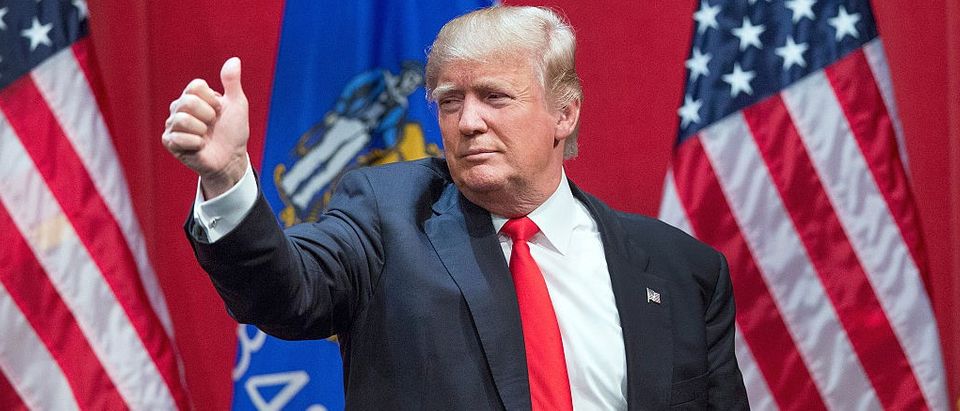Is Donald Trump serious about pulling the United States out of NATO? And about forcing American allies like Saudi Arabia to reduce the price of oil in exchange for U.S. military protection? Much of the Washington establishment is astonished at these pronouncements — some calling the GOP front-runner “completely uneducated” and even “delusional.” But Trump’s challenges to conventional wisdom aren’t really aimed at abolishing America’s overseas alliances so much as forcing a long-overdue rethinking of time-worn Republican foreign policy assumptions. And for inspiration, he’s turning to a once-vibrant, now all-but-forgotten political movement known as “America First,” which represented a point of view once native to the Republican Party.
America First was founded in 1940 as a kind of national resistance campaign to efforts by political elites to drum up support for U.S. involvement in World War II, which dissolved the day after Pearl Harbor. Its proponents were hardly pacifists: They strongly supported – and still do today — the establishment of a robust U.S. military but they forswear the use of U.S. power to topple governments or to rebuild war-torn nations. And they are wary of binding overseas multilateral alliances that can suck America into places and conflicts where the country doesn’t really belong. America Firsters saw the toll that World War I took on thousands of American soldiers who died in bloody trench warfare – mainly, in their view, to “save” Europe. They want the nation’s treasure spent solving America’s own vast domestic problems – the world’s troubles be damned.
It sounds archaic, of course, a throwback to a bygone era of strict “nonintervention.” But America First was no mere fringe movement. In its heyday, it claimed nearly 1 million adherents in 450 chapters nationwide. It was chaired by General Robert Wood, chairman and CEO of Sears & Roebuck, and supported by noted celebrities like novelist Sinclair Lewis, film producer Walt Disney and legions of young politicos including a future Republican president Gerald R. Ford (even a young John F. Kennedy praised and donated to the cause). Their belief that America would remain strong if it avoided foreign entanglements, especially in Europe, may well have delayed U.S. involvement in World War II, forcing Great Britain and the Soviet Union to bear the brunt of the war, possibly saving hundreds of thousands of American lives.
Back then, many Americans, mostly in the heartland, were not enamored of the idea that the country had a Manifest Destiny to police the world, or to right all moral wrongs. It was the Democrats, beginning with Woodrow Wilson, and later Franklin Roosevelt, who espoused a messianic idealism that would place the United States and its democratic ideals at the center of a new world order, with institutions like the League of Nations and the later the United Nations reflecting a benign – and in retrospect, naïve — hope that a global consensus on war and peace, economic development and human rights could be achieved – and enforced.
Mainstream Republicans, led by a victorious general-turned-president Dwight Eisenhower, were eventually won over to Wilsonian idealism, but currents of dissent and hostility have lingered for decades, reappearing in the presidential campaigns of segregationist George Wallace in the 1960s, populist H. Ross Perot and Republican Pat Buchanan in 1992 and 1996 and libertarians Ron and Rand Paul since 2000. Even the Tea Party, which has questioned America’s enormous waste on military spending and whose congressional representatives have successfully lobbied to have some major U.S. weapon systems cancelled or delayed, have become heirs to the America First movement.
And it’s not just Trump, either. To the chagrin of the GOP’s defense hawks, Ted Cruz has largely joined Trump in denouncing overseas interventions in Libya as well as the one proposed for Syria on the grounds that no vital national interests are at stake. Whether Cruz actually believes his critique as much as Trump does his is anyone’s guess. But it’s indicative of the strength of the new populist wave sweeping the Republican Party that its leading 2016 standard-bearers are espousing these views with impunity, not caring what vitriolic establishment critics – including Marco Rubio, who has publicly denounced both men – seem to think.
Does “America First” amount to a coherent foreign policy doctrine? Maybe not, especially when pushed to extremes, but it does present lines of argument that are likely to prove compelling at a time when many Americans fear that the country is too vulnerable to foreign influence – be they illegal immigrants flooding across the U.S.-Mexico border, militant jihadists poised to shoot and kill, or spying and trade-warring agents from China and Japan. Trump’s argument that overthrowing foreign dictators creates power vacuums and can breed political instability is hardly far-fetched – it’s a widely accepted principle of statecraft, in fact. And Trump’s belief that NATO might have lost its original mission and needs to be reoriented to deal with ISIS and global terror is a view that a growing number of dissenting academic experts have embraced, too.
Not all overseas U.S. involvements detract from the healthy pursuit of American self-interest, of course. And yet it’s hardly reckless demagoguery to suggest that there are fiscal and political trade-offs between focusing on domestic problems and those of the world at-large. Americans know full well that U.S. overseas influence is dwindling and they have a right to know where their precious tax money is going – and why. In failing to grasp this elementary angst and demand for accountability, it isn’t Trump that’s out of touch – it’s his critics.


